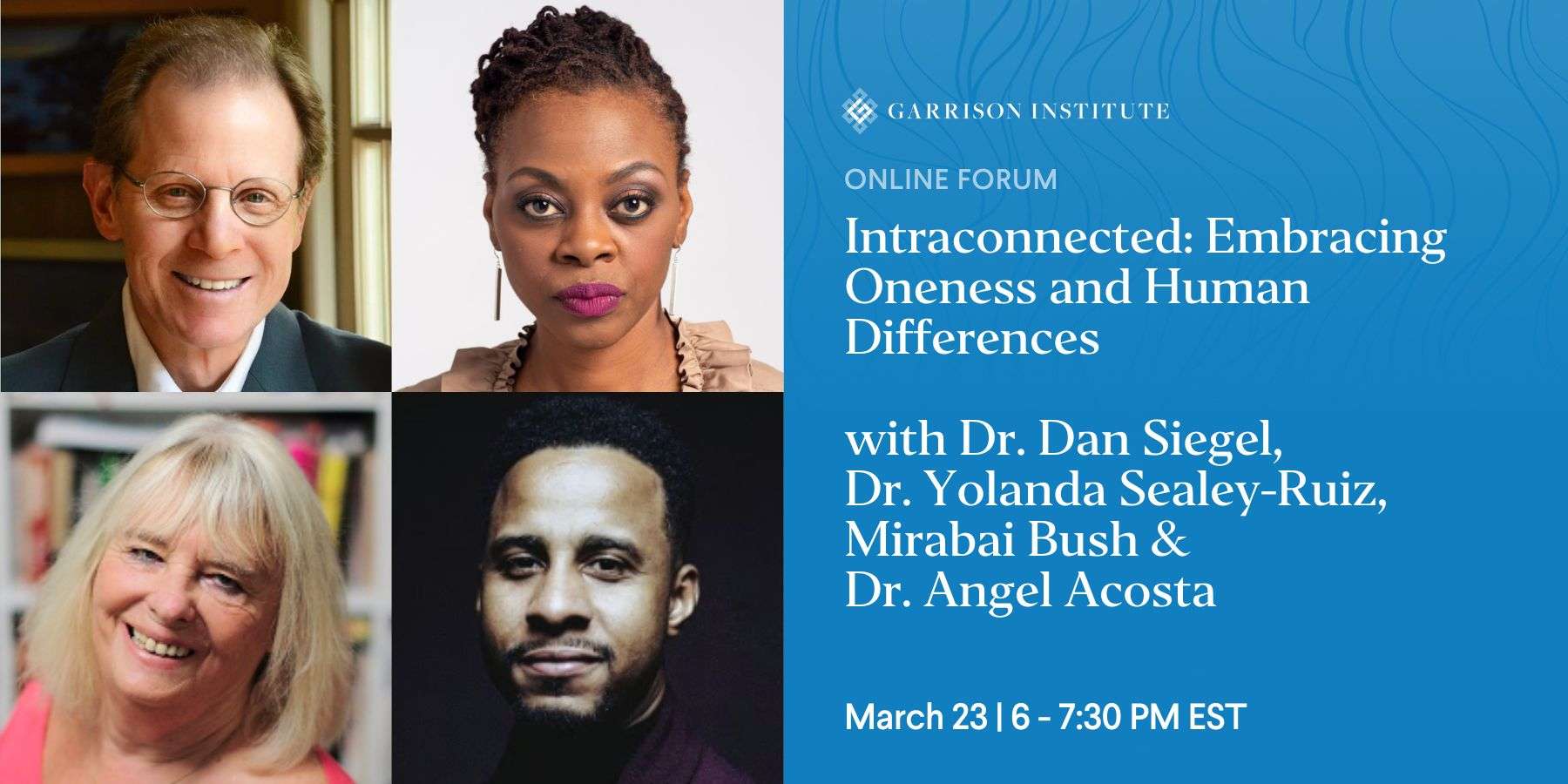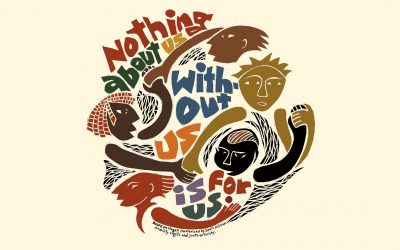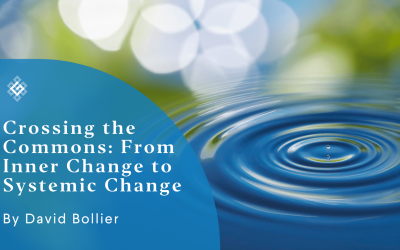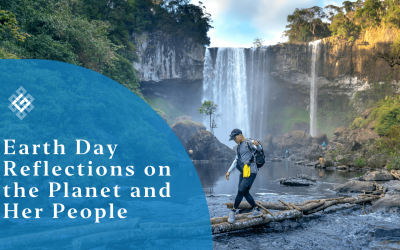Drawing on spiritual, scientific, and sociological expertise, this March 23 forum explored insights from Dr. Dan Siegel’s new book, Intraconnected. Dr. Siegel, Mirabai Bush, Dr. Yolanda Sealey-Ruiz, and Garrison Institute Fellowship Director Dr. Angel Acosta explored how to overcome the limiting belief of an isolated and disconnected self, in favor of a self that is “a part of a synergy of systems much bigger than the individual.”
The forum opened with Dr. Acosta asking Bush and Dr. Sealey-Ruiz to give their impressions of Dr. Siegel’s new book. Bush started by discussing the title, Intraconnected.
“For years, we’ve been talking about interconnection, and we still have a lot of work to do there… but the deeper, bigger truth is that we are all one. We are all part of the same thing, and by writing this and naming it… and approaching it in an intellectual, scientific, rational way gives people a safe place to start incorporating it,” said Bush.
Dr. Sealey-Ruiz discussed how Dr. Siegel used an anecdote about a horseback riding accident as a way of showing the reader how traumatic experiences can help people understand who they are.
“I thought a lot about the concept that Dr. Acosta talks about in terms of ‘wounded healing’… the poet Rumi says that ‘the wound is where the light enters.’ Some of us are also familiar with the concept called ‘broken open,’ where we are ‘broken open’ when we experience trauma. When we experience what Jack Mezirow says are disorienting dilemmas, where we see ourselves anew or differently. It struck me that you made such a powerful connection to that incident… that accident, that dilemma, that ‘broken open’ moment to becoming who you are.”
Dr. Siegel said the book was written out of wrestling with trauma, and identified what he believes is a universal trauma in modern times.
“The biggest trauma of all… is that we’re basically told a lie. Who we are, this name we’re given, is the totality of our identity. That’s not found in indigenous cultures nor in contemplative practices. There are many cultures existing today that have held on to a much larger view of the self, but in modern times, with European origination that is colonialist and has an individualistic perspective (that is unfortunately spreading around the world)… it’s a trauma in and of itself.”
Siegel went on to identify other ongoing traumas that can serve to shake people out of the “distracted fantasy of certainty” and realize that “we have work to do.”
“I don’t think that you need a personal problem that only your individual body experienced,” he said. “Being part of a racist society does it for everyone, or if you just read the Intergovernmental Panel on Climate report that came out this week, it is absolutely traumatizing to read that in the sense that it shakes you awake… it’s a very sobering account that humanity has failed and continues to fail to do what people have been saying. Thousands of scientists have been saying there’s a pathway to turning things around, here are what nations have to do with their corporations and citizens, and it’s basically not being done… the climate crisis is also kind of a wake-up call.”
Later in the video, Dr. Acosta asked what he said would be a challenging question. He walked through a number of forms of trauma, bias, violence, and structural oppression that different groups experience, and questions how to reconcile those experiences with the idea that we’re still intraconnected.
“It’s difficult when you’re talking about the experience that people of color, especially black people, feel,” Acosta said. “And in a conversation around that reality, when you move to “we are all one,” or move to “we all suffer.” It becomes difficult, so I’m fascinated. That example cuts across other scenarios, not just with race, so I’m just fascinated by this inquiry that your book has put me on, this provocative tension between the intraconnected nature of reality and the fact that we’re all one but we’re all experiencing suffering in such unique ways. It becomes difficult when we’re dealing with the most pressing issues.”
Dr. Sealey-Ruiz answered first, saying that just because some people create policies and structures that treat people differently, it doesn’t mean that we’re not all one, spiritually.
“Dan was talking about the patriarchy, the white hegemony, the society we live under,” she said. “The trauma is that those who have kind of snatched the country and stolen it, have operated under the premise that we are different because race, sexual orientation religion… in some ways, humanity has been kidnapped, and we are living with that collective trauma. But fundamentally, from a spiritual standpoint, from the work that Mirabai has dedicated her life to, Dan, and so forth, we know that we are 99.9% the same. But the racists tell us we’re different. Just because it’s not being recognized, and sadly so, with the traumas, doesn’t mean that it’s not true.”
Siegel detailed a process he calls “integration,” which he defines as “differentiation of aspects of a system that then become linked.”
“The important issue is that in the linkage, they don’t lose their differentiation,” he said. “When I hear the phrase, ‘unity and diversity’ as another way saying we are all one, it’s really about integration, where it’s not like blending, it’s not a smoothie. It’s more like a fruit salad. You retain the wonderful heterogeneity, the differences, the differentiated nature of who we are with our histories, but at the same time you become linked in an ‘intraconnected’ way. We’re always saying, ‘can we differentiate and link?'”
Established in 2020, the Garrison Institute Fellowship embraces the emergent nature of our times. Widespread socio-political discord, an escalating global pandemic, the ongoing environmental crisis, and socioeconomic precarity have created an inflection point fraught with collective anxiety and the potential for new leadership paradigms. In response, an emerging field of organizations and networks are applying contemplative wisdom to catalyze healing and action. The transformative change at the core of their work will benefit from visionary leadership that will invigorate our collective imagination and help us to harness the practical skills needed to navigate our turbulent times.




